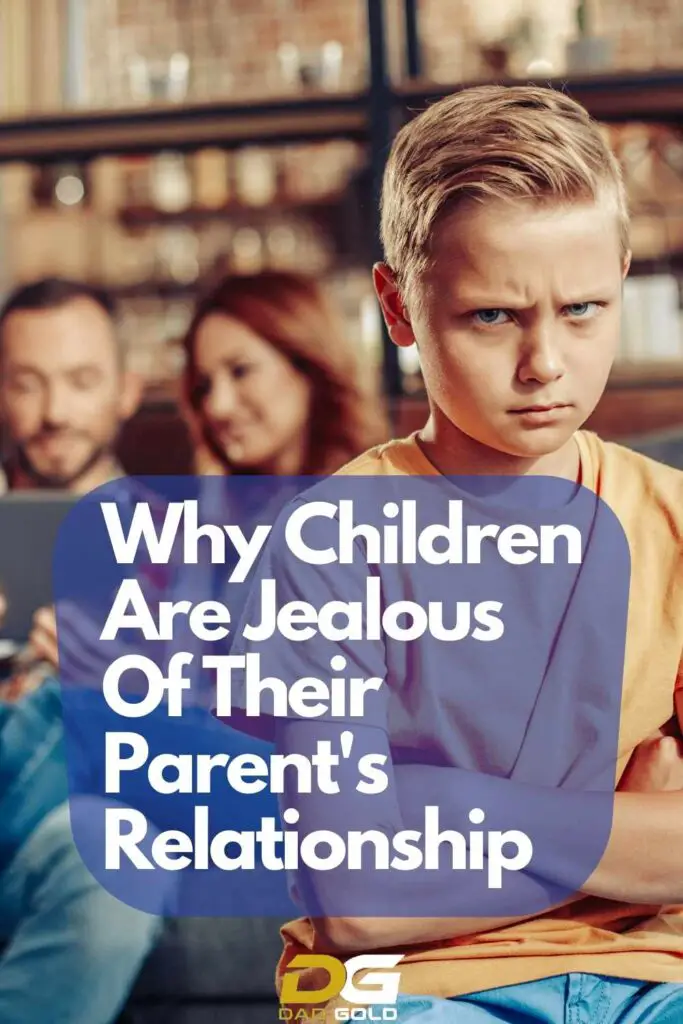Imagine having a great family night at home, and you or your partner leans over to kiss the other.
It’s the perfect moment.
Except for some reason, your child starts to cry. They start freaking out, and the whole atmosphere and the vibe shift.
Does this sound familiar?
It’s not uncommon for children to be jealous of their parent’s relationship. It may be frustrating because your child can’t explain why they feel that way. But there is likely an underlying cause behind the attention-seeking behavior.
Once you understand the why behind the behavior, you can work to change it.
Let’s look at some of the most common reasons children are jealous of their parent’s relationship.
I’ll include some tips on what you can do to address these behaviors when it happens.
-

Bold Male Pride – Baseball Trucker Cap Celebrating Masculinity
£18.00 Select options This product has multiple variants. The options may be chosen on the product page -

Dad Bod Appreciation Gift Mug
£14.00 Add to cart -

Dad Bod, Bad Jokes Structured Baseball Cap
£22.00 Select options This product has multiple variants. The options may be chosen on the product page
With time and patience, your children will learn not to be jealous of your relationship.

3 Main Reasons Why Your Child Is Jealous Of Your Relationship

Being a parent is tough, and it sometimes harms your relationship.
If your relationship remains strong (good for you), but your son or daughter shows signs of jealousy, there are 3 reasons you should consider.
Here they are:
They are more attached to one parent

Is one parent home more?
Does one parent interact more with the child?
It could simply be that your child is more attached to one parent than the other.
Because of it, they don’t like when the parent shows any attention or affection towards another.
It doesn’t matter who it is; the child believes all affection should be reserved only for them.
It should be the same when they are alone with just them and the preferred parent.
When there are other people around, this can lead to jealousy. This could express itself in different ways.
Such as:
- Crying
- Yelling
- Destruction
- or any number of attention-seeking behaviors.
How to address this with your child
Take a look and try to understand which parent your child is more attached to, and you will want to approach it in two different ways.
For example, if the child is attached to the mother, the mother will want to talk to the child and explain that they can love more than one person.
The love you feel for your partner is different from the love you feel for your child.
After all, love is not a finite resource!
It grows and expands over time.
Next, you want to strengthen the attachment to the other parent. Using the same example, if the father works out of the home and is not around as much, he must make an effort to spend more time alone with the child.
Have a daddy and me day where you go out and do fun things.
Play games or interact with your child at home – it doesn’t matter what you do, just that you do it.
To keep in mind is to be sure not to overcompensate and only become the “fun” parent. This will lead to other behavioral issues.
Your child feels neglected or left behind.

Children act out in all sorts of ways when they want attention.
Being jealous of their parent’s relationship is another way they can express this attention-seeking behavior.
Even if your child is not neglected, they feel it, causing them to act out.
And it’s not just when you show affection to your partner; it also happens with any friend, family member, or new partner.
Your child feels that because you are showing another attention, that somehow means they are getting less. They may also think that you have forgotten about them.
Jealously could show when you have a new baby, for instance. Or it could happen when you show an older sibling more attention.
How to address this with your child
No child can get attention all the time. It’s unsustainable, so this jealousy and attention-seeking behavior is completely normal.
It’s part of normal child development, so you mustn’t give in to your child.
You want to explain to them again how much you love them and that just because you are giving attention to another does not mean you do not love them.
Do not adapt your behaviors around your child because they will learn all they need to do is make a scene to get what they want.
Their parent’s relationship grosses them out.

Children often think members of the opposite sex are gross – they have cooties!
So if your child is acting jealous, they could just be trying to get you to stop because you are grossing them out.
Girls and boys aren’t supposed to like each other!
How to address this with your child
Again, this is completely normal. While jealousy is an unusual way to express their feelings, they may not understand asking for what they want.
They might want you to stop embarrassing them with your affection, even if it is not directed toward them.
Like before, do not adapt your behaviors to account for your child’s feelings.
When they are older, they will appreciate that you modeled a healthy and happy relationship for them from a young age.
It is a parent’s right to embarrass their children; liking each other too much will probably be the least of their worries when they get older.
Dealing with Jealously – Here Are a Few Tips
Encouraging Open Communication
Jealousy can be a tough emotion for kids (and adults!) to deal with. It’s natural to want what someone else has, but when those feelings start to boil over and interfere with our relationships, it’s time to address them.
By encouraging open communication and the expression of feelings, you can help your child better understand and manage their jealousy.
But let’s face it – talking about feelings isn’t always the most exciting activity. So how can you make it more entertaining and engaging for your child? Here are a few ideas:
- Use play and imaginative scenarios to explore different emotions and situations. For example, you might use dolls or stuffed animals to act out scenarios where one character is jealous and then brainstorm ways to cope with those feelings.
- Use humor to help your child feel more comfortable expressing their feelings. Kids love to laugh, so try using silly voices or jokes to lighten the mood and make the conversation more relaxed.
- Make sure to give your child your undivided attention when expressing their feelings. Turn off the TV, put away your phone, and listen to what they say. This will help your child feel heard and understood.
So don’t be afraid to get creative when encouraging your child to express their feelings about jealousy.
Make an Effort to Include Your Child in Family Activities
One strategy for managing your child’s jealousy is to make an effort to include them in your family’s activities and routines.
But how can you make this inclusion more entertaining and engaging for your child? Here are a few ideas:
- Involve your child in age-appropriate decision-making. For example, you might ask for their input on date night plans or family vacation ideas. This will help your child feel like a valued family member and can go a long way toward easing jealousy.
- Create special traditions or activities that involve your child. For example, you might set aside a special day each month to do something special together as a family. This could be as simple as going on a hike or as elaborate as planning a mini-vacation.
- Turn everyday activities into opportunities for bonding and inclusion. For example, you might ask your child to help you cook dinner or do the grocery shopping together. These mundane tasks can become special moments of connection if you approach them with a positive attitude and an open mind.
- Get silly and have fun! Kids love to laugh and play, so don’t be afraid to let your hair down and have a good time together. Whether you’re playing a game or just messing around, it is important to let your child know that you’re there for them and that you value their presence in your life.
By including your child in your family’s activities and routines, you can help them feel loved and valued and ease any feelings of jealousy.
Seeking Outside Support – If Necessary
Sometimes, no matter how hard you try, you might find that your child’s feelings of jealousy are just too overwhelming to manage on your own. If this is the case, it might be time to seek outside help.
- Look for a therapist or counselor who specializes in working with children. Many therapists have a playful and creative approach to therapy, and they might use activities like art, music, or play therapy to help your child express their feelings and work through their emotions.
- Consider joining a support group for families dealing with similar issues. This can be a great way for your child to connect with others and feel less alone in their struggles. Support groups can be a lot of fun – you might even make new friends!
- Turn the search for outside help into a fun family activity. You might make a list of potential therapists or counselors and research them together, or you might even turn the search into a game by creating a scavenger hunt to find the perfect fit.
- Remember to keep an open mind and a positive attitude. Seeking outside help isn’t a sign of weakness – it’s a sign that you care about your child and want to do everything you can to support them. By approaching the process with a sense of adventure and curiosity, you can help your child feel more comfortable and excited about the journey ahead.
So don’t be afraid to seek help if you struggle to manage your child’s jealousy. By being proactive and open-minded, you can find the support and resources you need to help your child (and your whole family) thrive.
Conclusion
Ultimately, our children want to feel loved and valued by their parents. If they act jealous, they likely feel a certain way and don’t know how to say it.
If there is a big change in their life, like you’ve moved or gotten a new partner or a death in the family, consider how that impacts their behavior.
While we don’t want our children to dictate our behaviors, and we should not stop showing affection toward each other, being in a loving relationship will ultimately benefit your kids.
Being sensitive to how our children feel and talking to them is critical.
Be patient.
They may not know how to express what they need from you. You may have to read between the lines.
With consistent behaviors, your child should get over their jealous attachment issues.
Just because your child is not securely attached to you doesn’t mean they won’t be. You have to work to make them understand that both parents love them.
Showing affection toward each other does not take away from your love for your children.
Jealousy is a common emotion that children go through, so you might need to ride it out.
Good luck!


